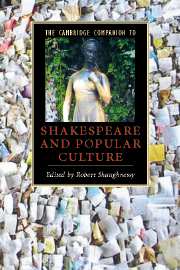The Cambridge Companion to Shakespeare and Popular Culture edited by Robert Shaughnessy (Cambridge University Press, 2007), ISBN 978-0-521-84429-1 (hardback), ISBN 978-0-521-60580-9 (paperback)
About the reviewer: Professor Tony Howard teaches on the English and Comparative Literary Studies program at the University of Warwick. His publications include: Women as Hamlet: Performance and Interpretation in Theatre, Film and Fiction (2007); co-editor of Acts of War (1996); Editor with Tadeusz Rozewicz, Reading The Apocalypse in Bed (1998); Translator with Barbara Bogocek and Ewa Lipska, Poet? Criminal? Madman? (1991), White Strawberries (2000); Pet Shops (2002); Sefer (2012); Translator with Barbara Bogoczek and Tadeusz Rozewicz, recycling (2001); Mother Departs (2013).
Whereas other recent studies have catalogued Shakespeare's raucous presence in genre TV, manga and even pornography - not to mention the plays' political appropriation by post-colonial cinema - Robert Shaughnessy's engrossing Cambridge Companion works out from a position in traditional English studies. He aims to extend our understanding of the 'popular' historically. Such pre-eminent scholars as Peter Holland, Barbara Hogdon, W.B. Worthen and Stephen Orgel provide informative, elegant surveys of the Shakespeare myth's evolution and dissemination through print culture, theatre and the visual arts in the eighteenth and nineteenth centuries. (Garrick, Shakespeare's PA and apostle, features in four chapters.) They then discuss the Shakespearean tourist industry, the star system, the electronic media, and finally the mind-blowing challenges of digital and internet culture.
 Revisiting Shakespeare's own career, Diana E. Henderson usefully tests it against several academic definitions of the 'popular' in early modern Britain, including the oppositional, the local, the demotic, and the non-literary traditions of revels, commedia and clowning. The book's refusal to tie itself up in theoretical debates, its focus on historical evidence, works well. However it does mean there are as many implicit attitudes to cultural politics here as there are writers, and the shape-shifting middle classes easily hold sway. In an indispensable essay Douglas Lanier provides the most supple and provocative intellectual perspectives.
Revisiting Shakespeare's own career, Diana E. Henderson usefully tests it against several academic definitions of the 'popular' in early modern Britain, including the oppositional, the local, the demotic, and the non-literary traditions of revels, commedia and clowning. The book's refusal to tie itself up in theoretical debates, its focus on historical evidence, works well. However it does mean there are as many implicit attitudes to cultural politics here as there are writers, and the shape-shifting middle classes easily hold sway. In an indispensable essay Douglas Lanier provides the most supple and provocative intellectual perspectives.
Elsewhere 'popular' comes to mean virtually anything post-Shakespeare, from Edward Gordon Craig's illustrated Hamlet ('a strictly limited edition on handmade paper, with a few copies also on vellum'. p.88) to philosophical metadramas on Radio 3. Several chapters discuss Shakespearean novels, including biographical fantasies and Hamlet variations, with some excellent perspectives on young peoples' fiction. However the treatment of Shakespeare on television is seriously disappointing - there is only a (good) analysis of 'serialising' strategies within the BBC's groundbreaking Histories sequence, An Age of Kings. Cinema is justifiably bypassed (Russell Jackson's Cambridge Companion to Shakespeare on Film's in its second edition); but Shakespeare on British radio is brilliantly served by Susan Greenhaigh's survey. She encapsulates seven decades of broadcasting with impressive clarity, pointing future researchers towards a wealth of Shakespeare-themed documentaries and audio drama. She sketches the debates between those for whom sound was the ideal medium for dramatic poetry and those who dismissed it as 'impoverished'. And she shows that 'the BBC's self-association with Shakespeare' (184) has taken very diverse forms, defying pat ideological labels.
Surprisingly some contributors, respectful of the past, are sarcastic about modern performers and consumers. Peter Holland's fascinating survey of 'condensed' stage versions from Stuart country houses and Commonwealth fairs to the Reduced Shakespeare Company is a delightful exception. Finally, two packed bravura essays open up the relationship between Shakespeare and pop music (Stephen M. Buhler) and (Carol Chillington Rutter) explore the Stratford theatres' changing strategies of graphic design. Both show that our 'commercial' and 'creative' responses to Shakespeare have always been inseparable. And they prove that scholarship at its finest is also a creative act.
Tony Howard